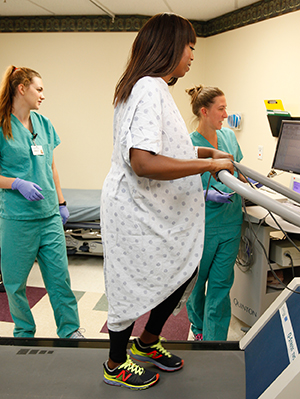Diagnosing Syncope

Syncope is loss of consciousness. It's also called fainting. Your healthcare provider will ask you about your fainting episode and your past health. He or she will also do an exam. You may need a number of tests to assess your symptoms.
Health history and exam
You may be asked about:
-
Where and when you fainted
-
How long you were unconscious
-
How you felt just before and right after you fainted
-
How you feel when you do moderate to heavy exercise
-
If you have a family history of heart disease or fainting
-
If you have a heart or neurological problem
-
What medicines you are taking
-
If you drink alcohol
-
If you use illegal drugs
Your healthcare provider will examine you and may:
-
Check your blood pressure while lying down, sitting, and standing
-
Listen for any heart murmurs or abnormal heartbeats
-
Listen and feel the pulses in your neck
-
Examine your eyes, reflexes, and limb movement
Tests
You may need 1 of more of the following tests:
-
Electrocardiogram (ECG). This test can help find a slow or a fast heartbeat.
-
Holter monitoring. You wear a portable ECG monitor for 24 to 72 hours. It records your heartbeat and looks for any problems.
-
Event monitoring. You wear a portable ECG monitor for several weeks. Like a holter monitor, it records your heartbeat and looks for any problems.
-
Echocardiogram. This test takes pictures of your heart with ultrasound. It can show heart valve or heart function problems. It can also show damage from a heart attack.
-
Electrophysiology studies (EPS). These help find weak, damaged, or overactive electrical pathways that make your heart beat too fast or slow. They can find the cause of a heart rate or rhythm problem. They can also help your provider decide how to treat it.
-
Tilt table testing. This testing helps show if changes in your body position affect your heart rate and blood pressure.
-
Carotid artery ultrasound. This test shows the blood flow through the arteries in the neck that supply oxygen and circulation to your brain. It can find any blockages in these arteries.
-
MRI or CT scan of the neck and brain. These tests see if there is something else going on in the brain that is causing a loss of consciousness. They scan the blood flow and brain structures. They are done in a radiology department.
-
Blood and other lab tests. These tests are used to find any problems in your body that may cause syncope. For example, low blood sugar can cause a loss of consciousness. It may be mistaken for syncope. Other wastes and toxins, and even dehydration, can affect brain function and consciousness.
-
Electroencephalogram (EEG). If your provider thinks you may be having seizures instead of syncope, this test may be done. Electrodes are put on your scalp. They measure the activity of the brain. A neurologist who specializes in reading EEGs studies the results.
You may need to see other specialists to fully assess the cause of your syncope. For example, you may see a cardiologist, a neurologist, or an ear, nose, and throat healthcare provider. Treatment will be based on the cause of your syncope. Ask your provider how you will get the results of your tests and what steps must be taken.
One of the concerns with syncope is being injured if you lose consciousness. Finding a cause for syncope can help keep you safe from injury. Don't drive a car, use heavy machinery, or do activities that may result in injury if you were to faint. Ask your provider when it will be safe for you to do these activities again.
Note about concussion
If you had an injury to the head, it is possible that you could have a concussion (mild brain injury). Symptoms of a concussion can show up later. For this reason, be alert for symptoms of concussion once you’re home.
Seek emergency medical care if you have any of the symptoms below over the next hours to days:
- Headache
- Nausea or vomiting
- Dizziness
- Sensitivity to light or noise
- Unusual sleepiness or grogginess
- Trouble falling asleep
- Personality changes
- Vision changes
- Memory loss
- Confusion
- Trouble walking or clumsiness
- Loss of consciousness (even for a short time)
- Inability to be awakened
During the time period that you’re watching for concussion symptoms:
- Don’t drink alcohol or use sedatives or medicines that make you sleepy.
- Don’t drive or operate machinery.
- Don’t do anything strenuous, such as heavy lifting or straining.
- Limit tasks that require concentration. This includes reading, watching TV, using a smartphone or computer, and playing video games.
- Don’t return to sports, exercise, or other activity that could result in another injury.
Ask your healthcare provider when you can safely resume these activities.
© 2000-2025 The StayWell Company, LLC. All rights reserved. This information is not intended as a substitute for professional medical care. Always follow your healthcare professional's instructions.